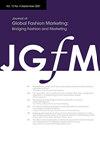黑色星期五:游戏改变了吗?
IF 5.5
Q2 BUSINESS
引用次数: 1
摘要
之前关于黑色星期五消费仪式的研究主要集中在店内顾客体验的规划和购物上。然而,近年来,消费者对黑色星期五的看法和购物行为已经开始发生变化。消费者更早地购物,转向网上,利用送货和路边取货的优势,并期望零售商提供安全、社交距离远的购物体验。这项研究的理论基础是社会学领域内的社会变迁。本研究的目的是研究各种因素,如流行病、零售商策略、网上购物、文化趋势如何重塑消费者对黑色星期五的看法和购物行为。数据是通过对过去曾在黑色星期五购物的消费者进行31次现象学访谈收集的。结果根据现象学的协议进行分析,并以从数据中出现的主题的形式呈现。总体而言,消费者认为黑色星期五已经发生了变化,影响力减弱了。这些变化是由于大流行期间商店的安全政策和程序、零售商延长了“黑色星期五”购物的天数和周数、在众多在线购物选择中可获得产品的便利性和广度、经济对购物能力的影响,以及“黑色星期五”这个名字对一些购物者产生了负面影响。随着黑色星期五游戏的改变,对零售商的管理影响也得到了讨论。其中包括零售商可以用来吸引消费者的策略,因为他们试图改造黑色星期五,并在未来吸引购物者。本文章由计算机程序翻译,如有差异,请以英文原文为准。
Black Friday: Has the game changed?
ABSTRACT Previous research on Black Friday consumption rituals has focused on planning and shopping for an in-store customer experience. In recent times, however, consumer perceptions and shopping behaviors related to Black Friday have begun to shift. Consumers are shopping earlier, moving online, taking advantage of delivery and curbside pickup, and expecting retailers to provide a safe, socially distanced shopping experience. This study was grounded in theory from social change within the field of sociology. The purpose of this study was to examine how various factors, such as the pandemic, retailer strategies, online shopping, cultural trends are reshaping consumers’ views and shopping behaviors related to Black Friday. Data were collected via 31 phenomenological interviews with consumers who have shopped on Black Friday in the past. Results were analyzed according to the protocol for phenomenology and were presented in the form of themes that emerged from the data. Overall, consumers believed that Black Friday had changed and had become less impactful. Changes were due to store policies and procedures around safety during the pandemic, retailers extending the number of days and weeks for Black Friday shopping, the convenience and breadth of products available among a plethora of online shopping alternatives, the impact of the economy on the ability to shop, and how the name Black Friday has negative associations for some shoppers. Managerial implications for retailers were discussed as the game of Black Friday has changed. Implications included strategies retailers can use to entice consumers as they try to revamp Black Friday and engage shoppers in the future.
求助全文
通过发布文献求助,成功后即可免费获取论文全文。
去求助
来源期刊

Journal of Global Fashion Marketing
BUSINESS-
CiteScore
6.90
自引率
31.60%
发文量
34
期刊介绍:
The Journal of Global Fashion Marketing is a quarterly journal that publishes peer-reviewed conceptual and empirical papers and business cases of original works that significantly contribute to the overall advancement of marketing theory, research, and practice in fashion, design, and culture. JGFM endeavors to be a “global bridge” connecting marketing scholars and practitioners in fashion, design, and culture throughout the world. We publish high-quality scholarly articles on marketing written by contributors representing the leading academic authors. As we state on the cover of every issue, our positioning statement, our value added to the marketing scholar readership, is truly to “Bridge Fashion and Marketing” 1. Monitor and analyze global fashion marketing trends. 2. Generate and integrate new ideas and theories related to fashion, luxury, and culture marketing theory and practice. 3. Apply new research methods and techniques in fashion, luxury, and culture marketing. 4. Explore and disseminate cutting edge fashion marketing practices. JGFM welcomes manuscripts that provide fresh, innovative insight to any topic in the field of fashion, luxury, and culture marketing. Both conceptual and empirical works are valued, so long as the manuscript addresses substantive issues in marketing.
 求助内容:
求助内容: 应助结果提醒方式:
应助结果提醒方式:


